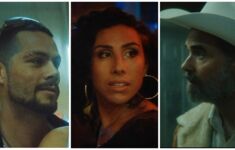River Gallo dishes on ‘Ponyboi,’ falling for Murray Bartlett, and the allure of the cowboy
River Gallo opens up about how Lana Del Rey's 'Born TO Die' album changed the way they see the world.


With their feature film debut Ponyboi, intersex actor-writer-model-activist River Gallo isn’t just making a movie—they’re making a movement.
Raised in New Jersey by Salvadoran immigrant parents, Gallo was told from a young age that they were different—told they’d need to take hormones and undergo so that they could live life as a “normal” male.
Years later, they would follow their creative passions to study acting at NYU, and later to USC’s School of Cinematic Arts to earn their master’s degree. At 27, while doing research for the senior thesis film (the short “Ponyboi”), they first encountered the term “intersex”—someone born with male and female biological traits—and began to realize they weren’t so alone.
Your daily dose of fabulousi-TEA
Subscribe to our daily newsletter for your front-row seat to all things entertainment with a sprinkle of everything else queer.
Since then, Gallo’s career as both an artist and activist has taken off. They were one of GLAAD’s Rising Star Grant recipients in 2019, they founded a production company focused on QPOC-created work, they appeared in a memorable episode of Love, Victor and a handful of other trailblazing short films, and they were one of three subjects of the groundbreaking 2023 documentary Every Body, examining the misconceptions of the intersex community and the challenges they face in their day-to-day lives.
Related:
River Gallo brings intersex issues to mainstream consciousness with film “Ponyboi”
River Gallo’s 2019 short film Ponyboi, which he has called “the first film created by and starring an out intersex person in the history of cinema,” follows the story of a Latinx intersex runaway.
And, all that time, they worked at fleshing out their short film “Ponyboi”—the project that became a catalyst for so much change and growth in their life—into a feature-length film. Last month, Ponyboi (which they wrote and starred in, directed by Esteban Arango) premiered at the Sundance Film Festival to a warm reception.
Loosely inspired by elements of Gallo’s life, it tells the story of the titular sex worker who gets caught up in a cat-and-mouse chase with the local mob and finally decides to take control of their life. That makes Ponyboi one of the first-ever narrative films to focus on an intersex character, and Gallo one of the first-ever intersex actors in a lead role.
Shortly after their history-making debut at Sundance, Queerty caught up with Gallo for our rapid-fire Q&A series, Dishin’ It. In our conversation, the star opens up about the classic “Jersey stories” that inspired Ponyboi, how they found their film’s incredible cast (including Dylan O’Brien and Murray Bartlett), and the pop album that opened their eyes to a whole new world.
Is there a piece of media—whether a movie, TV series, book, album, theater, video game, etc…—that you consider a big part of your own coming-out journey, or that has played an important role in your understanding of queerness? Why does it stand out to you?
Lana Del Rey‘s album Born To Die: The Paradise Edition. She’s just such an inspiration to me on so many different levels. But I think something that she really unlocked for a culture—and I think why she means so much to queer people—is that she really talked about the pain, the beauty in the pain, and the beauty transcending pain. And also just being, like, hot and tormented.
But also heartbreak. I think there’s a specific flavor of queer heartbreak, and I’ve been thinking a lot about trans heartbreak and how, when you are a woman or trans-femme or non-binary, you exist at the chokehold of
the patriarchy. And there’s something really sad about that. And yet, I feel like her expression of that sadness in her poetry, her lyrics, in the beauty of the visual universe that she created, felt like such a departure in my own in my own creativity of how I can own my own sadness and be able to express it in a way that actually gives you power.
Your film Ponyboi is a project that’s taken on various forms over the years, so I’m wondering if you could tell us a bit about how you started to flesh out the story from the 2019 short to the feature. Were there others film or stories youf elt inspired by?
Well, when I did the short, I always had the idea that it’d be a feature. But, when i made the feature,I found myself in a position where I was faced with the task that, in order to expand, I had to go deeper. I had to kind of touch on things in my identity that I couldn’t completely in the short—specifically around my relationship with my father and my mother, as it pertains to being being being intersex. Plus, the connection of them being immigrants from El Salvador and how that affected my relationships, my gender, and how they handled the situation around me being intersex. And I found a lot of healing around the fact that they did in those circumstances.
Also, the feature evolved into a crime thriller, which I didn’t anticipate. It was a departure from this tender, dramatic story in the short—which the feature also has elements of—but I knew I wanted it to enter the popular culture. So I knew that, to do that, I wanted to use certain frameworks of the mob mythology and the New Jersey mythology—The Sopranos, Goodfellas, movies that I grew up with. So I wanted to kind of critique it, poke fun at it, and also subvert it and make it queer. And by putting this intersex character at the helm of it, I could create a kind of Trojan Horse for people to actually learn what it means to be intersex.
On that note, your incredible cats—Dylan O’Brien, Victoria Pedretti, Murray Bartlett, Indya Moore—are all playing into and subverting archetypes from these iconic genres. What went into finding the right actors for these roles?
I was pretty involved with the casting, and also a lot of it happened organically.
Victoria, we became friends actually before the film started—she’s also a client of the same management that I am, so it was just a natural connection. She’s also from the Philly area and grew up on the Jersey Shore, so she’s very familiar with that world already.
Murray had, coincidentally, gone to a screening at Tribeca for the short film, and had connected with me before. But when Esteban [Arango] was pitching to be our director, he pitched Murray for the role of Bruce, and I was just like, “Oh my god, yes.” And he was such an angel—his character is what he’s like in real life. Working with him was such a magical and enchanting experience.
Related:
Sundance standout ‘Ponyboi’ has cowboy Murray Bartlett, sleazy Dylan O’Brien & a star-making River Gallo
‘Ponyboi’ is the queer thrill ride we’ve been waiting for.
And then Dylan… I mean, that was a role we were really, really conscious of the fact that it was going to take an actor with a lot of bravery. Because on one hand, it is our villain, he’s very violent and scary. But then I think in this day and age, I think a lot of cis-male actors are very wary of taking on roles that, in some way, oppress marginalized communities. But Dylan immediately connected with the script because he has a sibling that’s non-binary and trans, so it means that much more for him to be able to not only lend his talents, but his allyship to the movement. And that was another situation where we instantly fell in love—he means so much to me.
And Indya. I knew that I needed an actress that was going to bring this one big scene to the next level, and I didn’t have all the capacity and the education to know the intricacies of what it means to be a trans woman. And so it was collaboration between su to get that scene to the place it was, and to make it about the intersection between an intersex person who’s trans-questioning speaking to a trans woman who’s also affected by the patriarchy.
Since you touched on Murray’s character, Bruce—this classically masculine “cowboy” archetype—I’m wondering is that element pulled from your own life? Especially when you were younger, was this the kind of figure you felt drawn to, or attracted in?
Yeah, the cowboy character came from a few different things. Talking about American iconography, cowboys represent trailblazing the West, freedom. But in my research, I realized that the traditions of cowboy culture and the aesthetic actually are deeper and come from vaqueros—Mexican and, at the time, Spanish settlers, in Mexico and the Americas.
And my family actually had two cattle farms in El Salvador. And I recently found a picture of my grandfather who would wear a white cowboy hat. So it had these deeper, psychic relationships. between the roots of who I am and my ancestors. It was just a deeper dive and a more expansive understanding of what the cowboys means to me, and to the culture.
Scroll down below for more of our favorite shots from Gallo’s Instagram:

 Mark
Mark 







